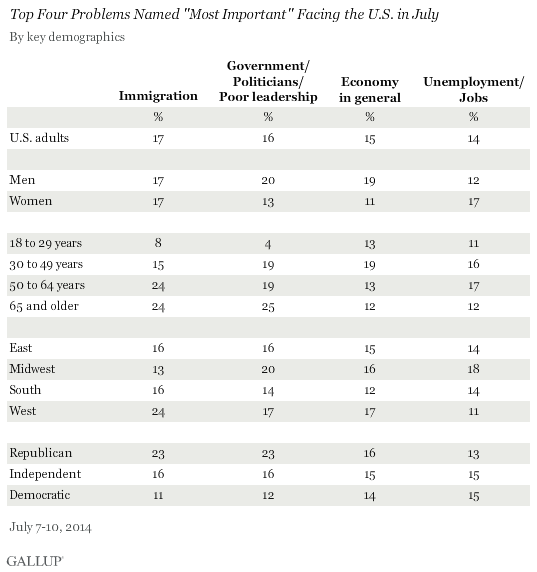PRINCETON, NJ -- With thousands of undocumented immigrant minors crossing the nation's southern border in recent months, the percentage of Americans citing immigration as the top problem has surged to 17% this month, up from 5% in June, and the highest seen since 2006. As a result, immigration now virtually ties "dissatisfaction with government," at 16%, as the primary issue Americans think of when asked to name the country's top problem.
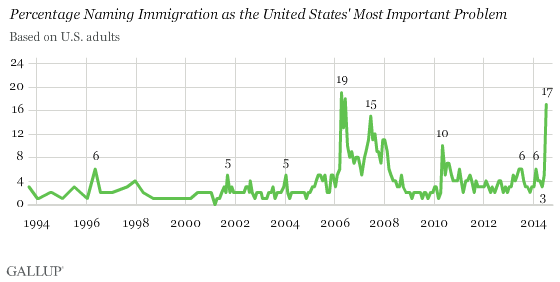
This is not the first time that immigration has spiked in the public's consciousness. Most recently, Gallup found the issue increasing to 10% in 2010, at a time when a new immigration law in Arizona was making news. And prior to that, it increased twice in 2006 to 15% or higher, amid congressional debate over immigration reform.
Signaling that public mentions of immigration today could be stemming more from concern about illegal immigration than from support for immigration reform, mentions of the issue are significantly higher among Republicans (23%) than Democrats (11%). Gallup polling earlier this year showed Republicans with a preference for focusing on sealing the border, while Democrats prioritized addressing the status of illegal immigrants already here.
Additionally, older Americans are more likely than those younger than 50 to name immigration as the top issue. Regionally, concern is highest in the West. See the table on page 2 for details.
The Economy Still Ranks High
The economy and unemployment rank just below immigration and dissatisfaction with government in perceived importance, at 15% and 14%, respectively. However, no other issue reaches double-digit concern this month. This includes healthcare, which declined by half as a perceived top problem since the open-enrollment period to buy health insurance through health exchanges (and the associated press coverage of the enrollment process) ended in April. Gallup's monthly trend shows mentions of healthcare dropping from 16% in January and 15% in April to 11% in May, 10% in June, and 8% today.
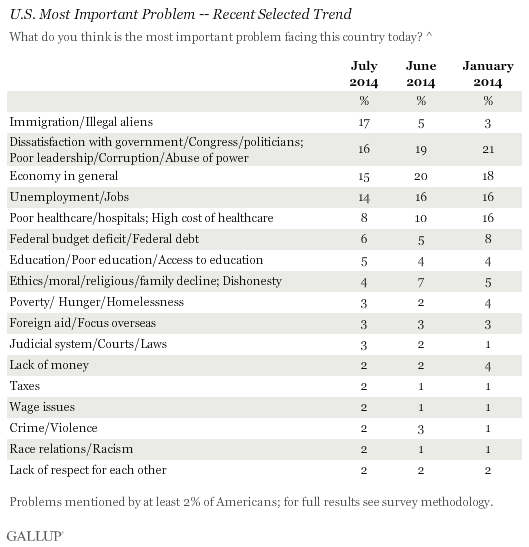
Overall mentions of the economy also have been eased in 2014, driven by modest drops in those citing unemployment/jobs and "the economy," generally. As a result, the percentage of Americans naming at least one economic problem -- what Gallup terms "net economic mentions" -- is now 41%, down from 53% in February, and well below the recent high of 76% seen in late 2011. This is also the lowest net economic mentions has been since January 2008.
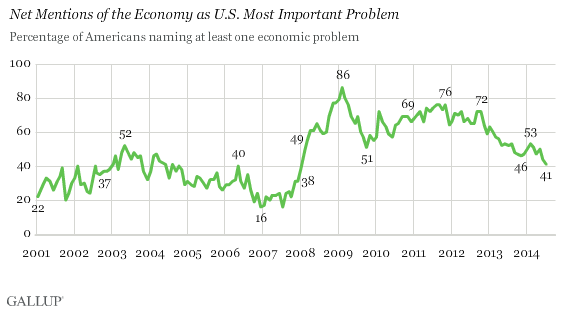
These results are from a Gallup survey conducted July 7-10.
Americans Divided Over Which Party Better for Top Issue
After naming the nation's top problem, respondents were asked to say which party can better handle that issue. And, based on history, the results are relatively positive for the Republicans, who are now at parity with Democrats, each chosen by 35% of Americans. This is similar to the Republicans' positioning on this question in 2010, shortly before voters gave their party a sweeping victory in the midterm House elections. Republicans were also practically tied with Democrats in 1994 and 2002 -- both years when the GOP fared well in the midterms. By contrast, in 2006, the Democrats held a record 15-percentage-point advantage on this measure and went on to retake control of both houses of Congress.
The only recent midterm election year in which Republican parity with the Democrats on this this measure did not foretell Republican gains in the midterms was in 1990, but that year an unusually high proportion chose neither party as the best for handling the top issue.
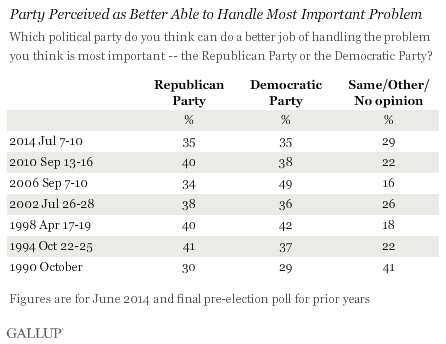
Bottom Line
Americans' perception of the main problem ailing the country continued its gradual shift away from the economy in July, while healthcare is also fading as a top-of-mind concern. At the same time, immigration has clearly captured public attention given the political and humanitarian crisis building at the border with the influx of thousands of children from Central and South America seeking refugee status.
Each previous spike in mentions of immigration as the nation's top problem was fairly short-lived. But with no solution to the current crisis in sight, and less than four months to go before the midterm elections, it is easy to believe the issue could still be a factor come November.
If so, the recent shifts in what Americans perceive to be the nation's top problem could be important. While the 17% of Americans naming immigration as the top problem is not large in absolute terms, the fact that the issue is of particular concern to Republicans and older Americans -- both groups that Republicans need to turn out in force in the midterms -- could be critical to the outcome.
Survey Methods
Results for this Gallup poll are based on telephone interviews conducted July 7-10, 2014, with a random sample of 1,013 adults, aged 18 and older, living in all 50 U.S. states and the District of Columbia.
For results based on the total sample of national adults, the margin of sampling error is ±4 percentage points at the 95% confidence level.
Interviews are conducted with respondents on landline telephones and cellular phones, with interviews conducted in Spanish for respondents who are primarily Spanish-speaking. Each sample of national adults includes a minimum quota of 50% cellphone respondents and 50% landline respondents, with additional minimum quotas by time zone within region. Landline and cellular telephone numbers are selected using random-digit-dial methods. Landline respondents are chosen at random within each household on the basis of which member had the most recent birthday.
Samples are weighted to correct for unequal selection probability, nonresponse, and double coverage of landline and cell users in the two sampling frames. They are also weighted to match the national demographics of gender, age, race, Hispanic ethnicity, education, region, population density, and phone status (cellphone only/landline only/both, and cellphone mostly). Demographic weighting targets are based on the most recent Current Population Survey figures for the aged 18 and older U.S. population. Phone status targets are based on the most recent National Health Interview Survey. Population density targets are based on the most recent U.S. census. All reported margins of sampling error include the computed design effects for weighting.
In addition to sampling error, question wording and practical difficulties in conducting surveys can introduce error or bias into the findings of public opinion polls.
View survey methodology, complete question responses, and trends.
For more details on Gallup's polling methodology, visit www.gallup.com.
